

by John Helmer, Moscow
@bears_with
At the end of President Putin’s war talks in Moscow with Turkish President Recep Tayyip Erdogan (lead image) on March 5, Erdogan refused to shake the hand of Russian Defence Minister, Sergei Shoigu.
Erdogan’s insult, in the presence of Putin, revealed the Turkish president’s anger at the defeat his ambitions have suffered on the battlefields of northern Syria, at the hands of the Russian military. By snubbing Shoigu at the farewells, Erdogan was revealing that he blamed the Defence Ministry and General Staff for opposing the terms of troop deployment, reinforcement of arms, and rules of engagement which he demanded, and was repeatedly refused, during the five hours of negotiations.
Shoigu knows Erdogan knows that he expects him to attempt to break out of the new agreement, just as he has done with the two Sochi agreements of September 17, 2018 and October 22, 2019. Erdogan hates him for that. Shoigu is content to let Erdogan demonstrate to Putin which of them cannot control himself.
On March 19, when Erdogan, his Defence Minister Hulusi Akar and intelligence chief Hakan Fidan, decided on their breakout along the M4 highway, just as the Russians were expecting, they triggered a new test of Kremlin strategy.
The M4 highway in Syria runs westwards between Aleppo, skirting Idlib to the south, then down to Latakia on the Mediterranean coast. Erdogan wants the road for his new southern border of Turkish Syria.
Putin’s agreement with Erdogan pushed him off the highway, northward. It also implied that the Syrian Army would recover the highway and eventually the city and province of Idlib which Erdogan has tried to keep for his forces. The terms of the March 5 agreement frustrated him by creating a new “security corridor” of about 80 kilometres in length, east to west, and 12 kilometres deep, south to north. On the map this is shown as the pink zone from Tronba (spelled Trumba in the agreement), near Saraqib to Ain al-Hawr (Ain-Al-Hayr). For the corridor to be jointly patrolled by the Turkish and Russian armies means the Turks aren’t allowed to send fresh troops, weapons and supplies down the road to the military posts, lines and bases they have established to stop the advance of the Syrians on Idlib.
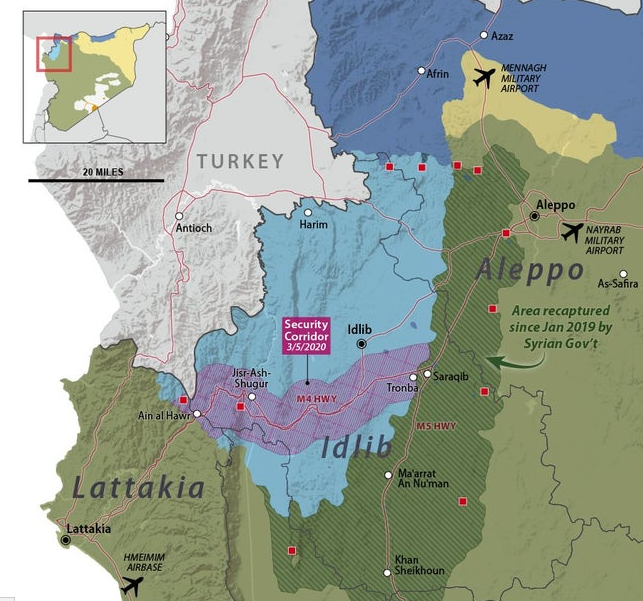
KEY: green=Syrian Army; light blue=Syrian opposition groups backed by Turkey; dark blue=Turkish Army; red squares=Turkish military posts. Source: https://i.redd.it/
The specific terms of agreement were these.
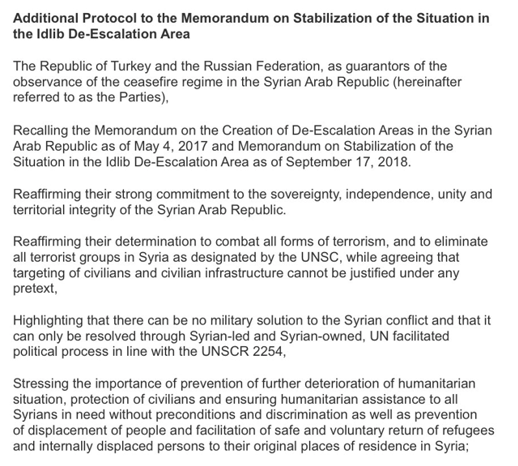
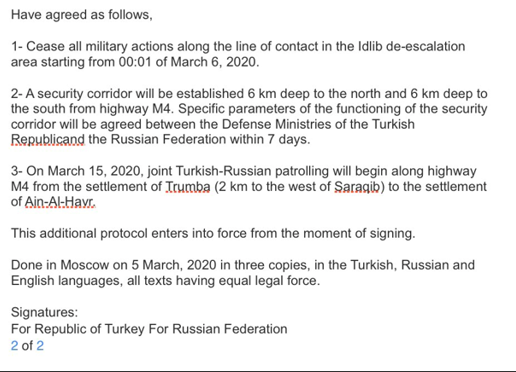
Source: http://johnhelmer.online/
What is happening on the ground in Syria is difficult to interpret. The record of Putin’s warning to Erdogan to stick to the terms is less ambiguous. On March 12 Putin telephoned the Turkish president at Putin’s initiative. Almost invariably in recent months, the initiative to telephone has come from Erdogan, and the Kremlin communiqué always says so. When Putin initiates calls, the communiqués usually omit to mention it. But not on March 12 — the Kremlin explicitly announced the call was “at the Russian side’s initiative”.
The published text was anodyne: the two men “noted with satisfaction a significant de-escalation of tensions in Idlib. Vladimir Putin and Recep Tayyip Erdogan reaffirmed the importance of continued close joint efforts, first of all between the Russian and Turkish defence ministries, in order to ensure a stable ceasefire and further stabilisation of the situation.” The meaning of “first of all” was blunt: Putin was telling Erdogan that Shoigu was in charge, and that if the Turks tried to recover the M4 corridor for themselves and their proxy troops, the Russian ground and air forces would support the Syrians in striking them.
Erdogan asked for delay, as he has repeatedly sought from Putin in the past. Putin agreed he could have an extra week to establish the joint patrols in the corridor, and to guarantee that Russian forces would not jam or assist the Syrians in shooting down Turkish surveillance drones in the air above the corridor. Erdogan didn’t tell Putin he was planning to send convoys of new troops, tanks, and other weapons westward along the road to reinforce and expand Turkish Army bases along the Idlib line. If he had, Putin would have told him that would a breach of their agreement.
The Russian grace period ended on March 19. It was on the morning of that day that Erdogan, Akar and Fidan decided to break out of the agreement.
There are different versions of what happened next. In this version from SouthFront, which compiles its information from local sources, “on March 19 morning, a convoy of the Turkish military was struck with at least two improvised explosive devices (IEDs) while traveling in western Idlib…According to opposition sources, the incident took place on the strategic M4 highway near the town of Muhambal. The highway links the coastal city of Latakia with Aleppo city, the industrial hub of Syria. The Turkish convoy was attacked by a group aiming to block the M4 and disrupt the Putin-Erdogan agreement.”
US and European propaganda sites claim SouthFront is on the Russian side in the Syrian war. “South Front is registered in Russia, money donated to the site goes to Russia and the editor is named Anastasia”, reported a European Union-funded outlet, the European External Action Service (EEAS), a year ago. “The most compelling evidence for South Front’s being Russian is in the content. South Front is not an alternative website, challenging the mainstream, corporate media. South Front is loyally relaying whatever suits the Kremlin, pretending not to be Russian.”
“Don’t be deceived, question even more” is the slogan of EEAS. In practice, deception is the EEAS mission, according to Dutch and Danish parliamentary and press investigations.
Back on the battlefield, interpreting the military situation on March 19, the SouthFront analyst claimed: “Reopening the M4 highway, which links the coastal city of Latakia with Aleppo, is the keystone of the Russian Turkish agreement reached on March 5. If Turkey fails to fulfill this term, the entire agreement will likely collapse. Radical militants, who threatened any force that would move to reopen the highway, attacked a convoy of the Turkish military on March 19. The attack, which took place on the highway itself, claimed the lives of two Turkish soldiers. Turkey is serious about reopening the highway. Nevertheless, Ankara’s influence over the Greater Idlib militants, who have been receiving support from it for around nine years, appears to be too weak.”
In this version, no sooner had the Turkish troops in the convoy cleared locals from the road, than “on March 20 morning, Syrian opposition supporters and radical militants re-blocked the M4 highway in Greater Idlib, challenging the will of their closest ally, Turkey. Local activists shared a video showing opposition supporters and militants gathering on the M4 to protest against the recent Russian-Turkish agreement on Greater Idlib. The protesters used bulldozers to establish several new barriers on the highway.”
Colonel Cassad doesn’t pretend not to be Russian; he is (real name Boris Rozhin). In his assessment, “the full patrolling of the М-4 route never began. Various ‘moderate’ and ‘extremist’ fighters continue to rally on the road and prevent the Turkish engineering equipment from eliminating improvised rubble and barricades. In fact, when blocking the route on the Nairab-Arima section, there was no genuine patrol except to show that we and the Turks are going somewhere together.”
Colonel Cassad wasn’t certain what happened on March 19, but suspected a Turkish deception operation. “The Turks suffered new losses the other day [March 19]. Two soldiers were officially killed by IEDs. Since the practice is used by militants in Idlib, someone decided to avenge Erdogan for his lack of determination…. On the other hand, it is quite possible that in this way the Turks will legalize the losses they have been hiding since February…”
Al-Monitor is an Arab publication based in Washington, DC. It has reported the joint Russian-Turkish patrols began on March 15, but were opposed on the highway by opposition groups. “The opposition is divided over the cease-fire agreement in Idlib,” reported an Arab journalist for Al-Monitor. “The sit-ins that seek to prevent the joint Russian-Turkish patrol mission on the M4 highway reflect the differing positions toward the agreement and its articles.”
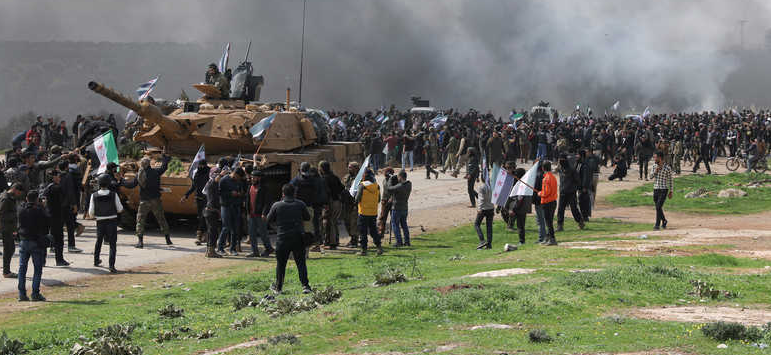
A demonstration of locals opposed to the terms of the March 5 agreement.
Kirill Semenov, Al-Monitor’s Moscow correspondent, reported that to operate the security corridor and joint patrols there is a “joint Russian-Turkish coordination center. A special communication channel continues to operate between the Russian Reconciliation Center for Syria and the Turkish military.”
“Local sources who spoke with Al-Monitor not for attribution said the residents of the area along with fighters of some SNA/NFL [Syrian National Army/National Liberation Front, both Turkish-backed opposition groups] believe that the joint patrols are a first step in the surrender of these areas to the regime of President Bashar al-Assad. As the locals noted, the distrust of Turkey on the part of some pro-Turkish forces and Idlib-based civilians may stem from leaked Russian military maps that show areas to the south of the security corridor along the M4 highway — that are controlled by the opposition — as being subject to eventual transfer to the Assad regime.”
“Although there was no indication of such a thing in the Additional Protocol to the Idlib Memorandum [March 5], multiple sources in Moscow with knowledge of the situation confirmed to Al-Monitor that the areas south of the M4 highway are to be transferred to Assad’s control in accordance with Russian-Turkish accords. This seems logical: if a security zone is created along the M4, the fate of the opposition forces based there will be sealed, cut off by the Russian control zone from the rest of Idlib, which is held by other opposition groups north of the M4.”
“Thus, regardless of the success or failure of the M4 patrols, the Russian side along with Assad’s forces will be ready to launch another military operation in Idlib south of the M4 that would lead to the deployment of the Syrian Government forces to the highway and the creation of a security zone along it to the south…Ankara currently has the equivalent of a mechanized infantry division in Idlib that may exceed the number of militants in the radical groups. Therefore, the Turkish side now has many more opportunities to influence HTS [Hay’at Tahrir al-Sham] than it did after signing of the 2018 Sochi Memorandum. Turkish inaction can no longer be justified and there could be a new round of confrontation between Ankara and Damascus — and by extension, Moscow.”
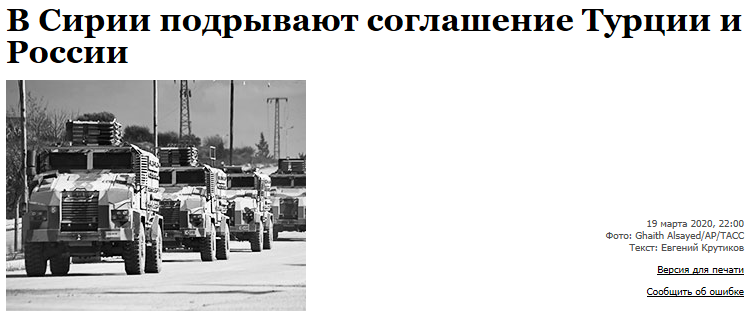
The headline says: “Turkey-Russia agreement undermined in Syria” -- Vzglyad report by Yevgeny Krutikov.
A report in Vzglyad by Yevgeny Krutikov was based on battlefield assessments assembled by the GRU. This concludes there had been a shooting-match on March 19, no doubt, between the Turkish Army and local oppositionists. But the strategic outcome is a Turkish design.
“The Turkish convoy was caught in a classic ambush for this kind of war. First, land mines exploded on both sides of the road as it advanced, after which the jihadists began to fire at the convoy itself. The Turks went to ground and took to the fight. Some sources report losses among Turkish soldiers… There is evidence that the Turks are transferring reinforcements to Muhambal. Syrian sources also report that fighters from both Hayat Tahrir al-Sham and the Pro-Turkish Jabhat Wataniya al-Tahrir are also flocking there. The ambush was set up by militants of the organization Hurras al-Din (‘Defenders of the Faith’), which broke away from al-Qaeda a couple of years ago. Al-Qaeda was not radical enough for them.”
“In general, the segment of the M4 highway from Jisr al-Shugur to Erikha (the central part) is home to the majority of extremely radical groups with a large number of foreigners. This was the first time the Turks had encountered such a situation. Despite the fact that even under the Sochi agreements they had to disarm all these barmalei [militants] — and for this they received preferences to stay in Idlib — the Turks never even made an attempt to do so. Their relationship with the radicals was limited to behind-the-scenes negotiations and pitting them against government forces. Now we have a ‘response’.”
“This is a real test for the Turks. It is possible to clear the M4 highway only by means of infantry combat, and the Turkish drones which have reappeared in the sky over Idlib, with the consent of the Russian side, are little help here. And there is the question of principle – either the Turkish army destroys the jihadists, or the Moscow agreements are in ruins.”
“There is, however, a strange detail. The ambushed Turkish convoy was a convoy, not a patrol. There is evidence that it included a Leopard tank; it did not move on its own, but on a carrier. The convoy may also have included the Atilgan SAM [Turkish surface-to-air missile ] This is far from what was envisaged in the Moscow agreements. This is not a patrol, but the transfer of heavy equipment along the highway, which, according to the provisions of the agreement, should become a demilitarised zone. In the past week, the Turkish side has been actively increasing its military presence in Idlib. Military equipment is transferred there by such convoys, as well as engineering equipment for fortified positions. The Turks are urgently building a full-fledged military base near the village of al-Jiha (this is in the direction of Aleppo). The Moscow agreements did not provide for anything like this.”
“All this time, the truce was observed at the front, and even Turkish drones appeared in the sky only with the general [Russian and Turkish] consent and exclusively for reconnaissance purposes. But in fact, the Turks are quietly building their own military infrastructure in Idlib, and on new principles and on a long-term basis. The Turks either cannot or do not want to bother with disarming or destroying radical groups in their area of responsibility near the M4 highway. The collision at Muhambal is the first test of strength. But disarming the militants and creating a demilitarised corridor near the highway is one of the key points of the Moscow agreement. Either you fulfill the contract or you don’t.”
This was the point Defence Minister Shoigu made to Erdogan and General Akar during the Kremlin negotiations on March 5. It is the also the point Shoigu has continued making to the Kremlin.
On March 20 Putin telephoned Syrian President Bashar al-Assad. The Kremlin release confirms it was Putin who initiated the call. “The two presidents discussed the developments in Syria, including in the context of implementing the Russian-Turkish agreements of March 5, 2020, on stabilising the situation in the Idlib zone.” This was an attempt at reassurance for Assad. If Assad asked what Putin intended to do to assure the March 5 terms, Putin’s answer is unclear.
The Defence Ministry’s assessment is certain — Erdogan and his men are breaking the March 5 agreement. “All this together,” reported Krutikov, “shows that, unfortunately, the current truce may not last until mid-April. Already [before March 19] there were enough signs of such a negative scenario. But now it is in focus very clearly.” That said, what the Russians have decided to do about it is not just uncertain. It has not been decided, yet.











Leave a Reply